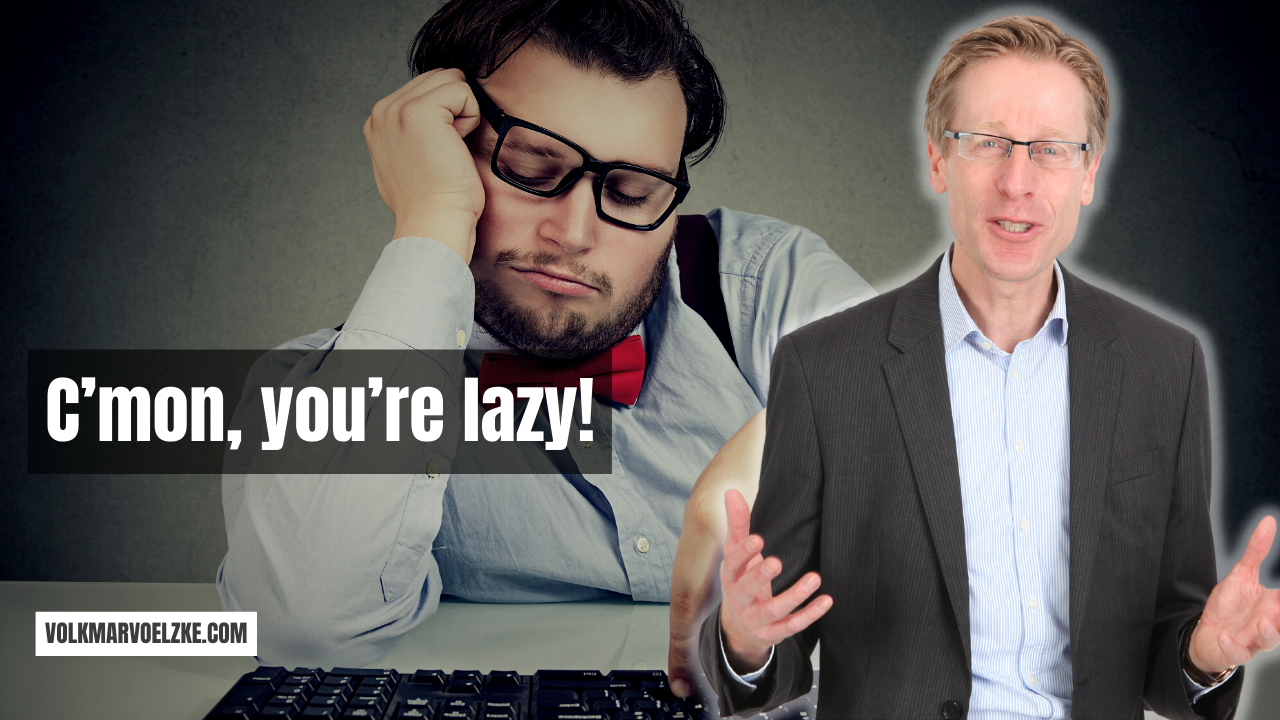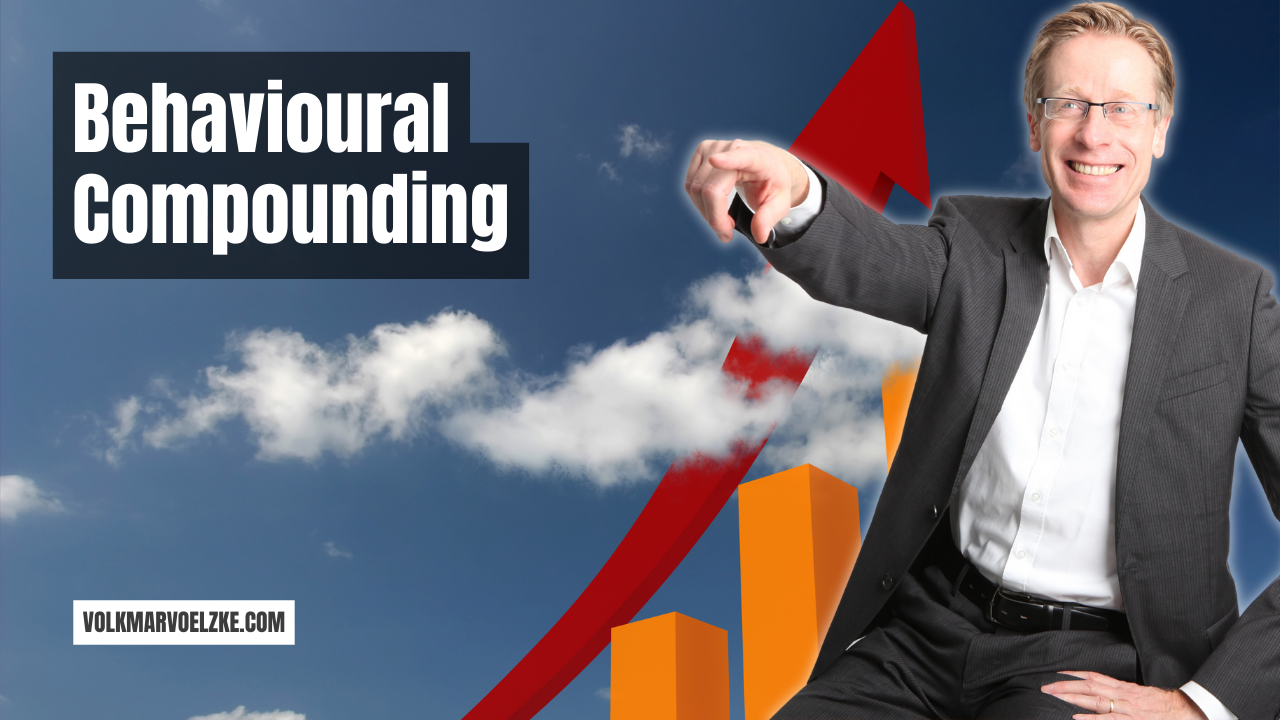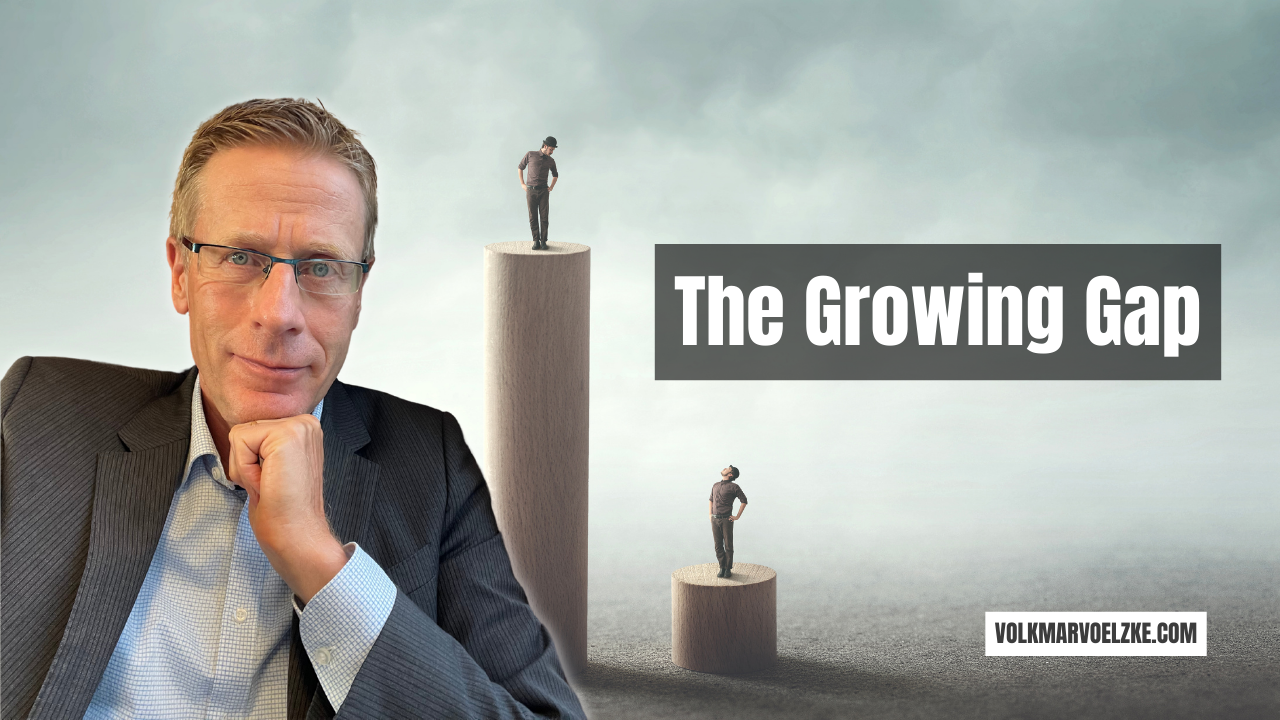😌 Basically, It’s All Pretty Easy…

The more I study the subject of success and why some businesses and people become much more successful much quicker than all the rest, the more it dawns on me that the key differentiators are pretty easy to understand.
And yet, most people try to figure out some techniques, methods, and processes that – if they would just optimize them – will lift them to higher success levels.
This is not entirely wrong, except for the fact that these improvements will never lift anyone to another level. Instead, they will do what all improvement activities do (if done the right way): they will – yes! – IMPROVE your situation. They will not transform your success, nor will they be a game changer.
Coming back to my opening statement, what are these “key differentiators” now? Well, simply put, it is the way people think that makes all the difference.
As this sounds a bit weird, I’d like to invite you to take a little test to see if you think...
🕺 Are You Comfortable Being An Influencer?

You may be surprised at the headline: "I'm not an influencer after all!" you may think.
Wait, not so fast: what is leadership but influence? That's right: nothing. Leadership without influence doesn't work.
Therefore, if you are a leader, you are automatically an influencer.
This is true even if you don't have a managerial position. Because leadership doesn't depend on your position, but on ... That's right: influence.
If we internalize this fact, we can also be open to learning from the so-called "influencers," those people who have millions of followers on social media.
Because many of them seem to know quite well how to influence others.
So here are three tips on what you can learn from influencers to increase your own influence and success as a leader:
-
Frequent and consistent communication.
Successful influencers are very good at sending very frequent messages to the community that they themselves embody. In doing so, they are consistent.
What does that accomplish? Well, you...
🦦 C’mon, You’re Lazy!

Yes, I risk offending you. Not the first time, though! Sometimes, I call myself a “tough love coach” and here we go: You are lazy! And if that helps you: I am too. So is everybody. Even the hardest worker is lazy.
What do I mean by this?
As you have heard a million times (at least from me), our brain is hardwired to keep us alive. Not to create great work or to be happy.
Not at all, we all prioritize the actions that most likely keep us alive. This instinct is controlled by our subconscious, by our lizard brain. We are not even aware of it.
Here comes my point: Science proves that all conscious thoughts and actual changes in our beliefs and routines require tremendous physical energy in our brain. That’s why a lazy brain is, in this sense, good for survival: it saves energy for more important stuff.
What I observe more often than not in organizations of all sizes is that people are remarkably tired when it comes to changing their beliefs about...
😨 The 3 Biggest Shortcomings In Leadership

Wouldn't it be cool to know what issues you need to work on first and foremost as a leader to become even more effective and influential?
Well, after working with leaders of all kinds for some time (i.e., over a decade), patterns naturally emerge. At least, that's how I feel.
The important thing is not to be fooled too much by symptoms. Because top leadership is rarely characterized by improving very specific routines.
That's helpful, but it doesn't get to the heart of the matter.
What I'm talking about here are the big levers that have an impact on many other things. If you improve these levers, the positive effect is multiplied.
Here are my top 3 shortcomings in leadership that are definitely worth working on:
-
Lack of desire to learn.
My classic question on this is: "How many books on personal development have you read in the last three months?"
I see a clear correlation between the willingness to learn systematically, i.e. to work on oneself, and the quality of leadership.
My...
📈 Behavioural Compounding

Some weeks ago, I was writing about the compound effect and how little changes can make a huge difference over time. Click here to read the article.
Today, I want to cover another, deeper aspect of the compounding effect: behavioural compounding.
The thing is this: all substantial improvements of any situation come from basically two angles. Either something from the outside works in your favour, or you and your team changes things from the inside.
To rely on the former is quite a risky strategy (as things can also get worse instead of better). Hence, the only reliable strategy to improve any given situation comes from inside. And this means, in most cases, changing decisions and actions which are driven by beliefs and values.
The consequence: to sustainably change our decisions and actions, we need to change our beliefs which materialise in our daily behaviours.
I know it sounds a bit too much when you hear it the first time, but let me tell you this: this...
😏 Are You Too Tolerant?

You get in life what you tolerate.
This is an old and true wisdom. If you tolerate certain negative behaviors in others, you will get more of them in your life.
Example: If you tolerate someone being consistently unpunctual, that person will continue to be unpunctual. And others will then be likewise toward you.
This is not about how you "educate" others, but about what you should allow into your life as a leader.
Because if you tolerate too much negativity, you won't have room for the important things that move you forward.
"Where does the different tolerance levels come from in different people?" you may now ask.
Well, like many things, it comes largely from the imprinting of our childhood. And like all these imprints, you can also change this one specifically in yourself.
Here are three questions that you can use to influence your tolerance threshold:
-
"Where am I too tolerant time and again?"
There are very different patterns of where you are too tolerant. It may be in certain...
↔️ The Growing Gap

I got used to the fact that most of those who ask for my support have three characteristics in common:
- They are already on a good level of performance and already had substantial accomplishments and want to move to the next level.
- They are willing, sometimes eager, to learn and grow.
- They are not ashamed to ask for help, are honest about their situation and know that support can move them ahead.
In brief, these are the top 3 characteristics of the most successful and – yes! – happy people.
My point is this: those who lack one or more of these traits are in fact even in a higher need for growth and support. The problem is, they are not stepping up exactly BECAUSE of their deficits. A classical catch 22!
Now, if you are reading this, chances are that you are in the success group. Your challenge might be about your team members who sometimes block themselves from growth. I know that this complacency of your people can drive you nuts (at least this...
💭 How Your Thoughts Drive Your Results

Everything that has ever been created by humans started with a thought.
Thoughts have power. Because they determine what we believe in - our beliefs. Our beliefs, in turn, determine our actions. And our actions determine our results.
In other words: How you think is the most critical building block for your success - whatever "success" means to you.
This is the key difference between those who achieve significantly more and the average: the super-successful have different ways of thinking. This is evident in every biography and documentary.
Simplified you can say: Small thoughts - small results. Big thoughts - big results.
In my observation and experience, most leadership teams think far too small. As a result, potentials are not even considered. They prefer to stick with what they know.
The good news is that you can change the size of your thinking. However, to do so, you have to persistently turn a few screws:
-
Schedule time to think.
Most leaders are so busy that they hardly...
🔪 Chop It Up!

One of the biggest obstacles that I see in organizations when driving any kind of transformation is the absence of emotionally appealing goals. The fact is that nobody ever changes behavior or even routines based on logic. Studies prove over and over again that we need emotions to move. Logic only makes us think.
So, why is it so difficult to define goals that make people move?
The simple answer is because most of us never trained to create them. From early ages on, we learned to create rational and logical goals.
Do I suggest forgetting all the things about SMART goal-setting and the like? No, not at all.
Instead, what I suggest is a 3-step method to boost the commitment of your people that many don’t know, maybe even not you.
It goes like this:
- Ask yourself: “If I were an employee who was expected to contribute to the business goal, how would I know and feel each day that I truly contributed?” You see the problem: it is very hard to see the...
📈 Your Untapped Market Potential

Especially in uncertain times, questions about how to leverage additional potential for sales and profitability are becoming increasingly important.
Time and again, I see that most of the discussions revolve around the core products.
In the process, a significant lever is neglected that is well known but pushed to the back of the agenda in most companies: Service.
Especially in most small and medium-sized companies, the full exploitation of service potential is a long way off.
By "service," I mean the entire end-to-end customer relationship from the very first contact to the generation of fans - and not just "after-sales service," as is the case with so many companies.
I believe that "after-sales service" accounts for just 10 percent of the potential.
What is the consequence of ignoring the potential? Less revenue, less profitability, less contribution margin and - most importantly - less prospect and customer loyalty.
The opportunity to create sustainably enthusiastic customers is...
